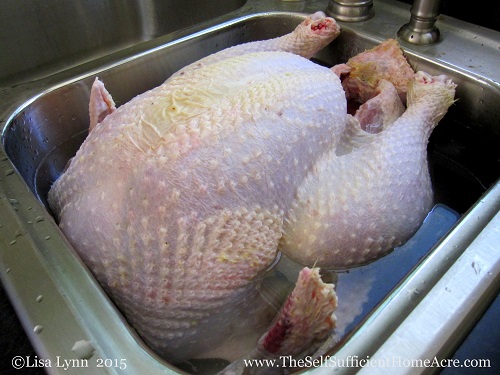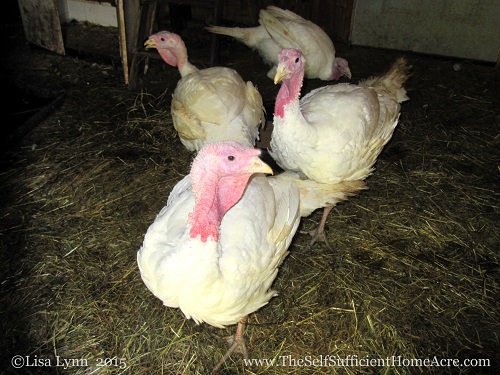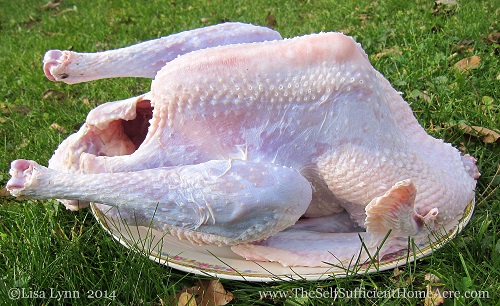Butchering An Injured Hen
One afternoon I went out to the chicken coop to lock up the hens, give them fresh water and feed, and collect the eggs. I noticed one of my older White Leghorns had blood on her feathers. I inspected her carefully for signs of vent picking. She had a small spot on her back, but no other signs of obvious injury. I decided to leave her for the evening and check on her again in the morning. I prepared myself for the possibility of butchering the hen if necessary.
For complete tutorials on butchering chickens, please see my post “How to Butcher a Chicken.”
An ‘Emergency’ Butcher Session
The next morning it became obvious that she was suffering. It wasn’t a particularly nice day. Temps were in the 20s as I prepared to perform an ‘Emergency Butcher.’ Rather than let the hen suffer, I culled her from the flock that morning. Since one little Leghorn doesn’t provide much meat, I chose another old hen, a Buff Orpington, to butcher too. With two hens cooked down I can make a nice casserole, big pot of soup or stew for several meals.
As expected, the White Leghorn was scrawny and the Buff Orpington was rather fatty. Every Buff Orpington I’ve ever butchered had yellow fat deposits in the abdomen. Some homesteaders use the fat to render down and grease their pans or use in baking. I fed the fat back to the other chickens, along with the rest of the offal.
I don’t want my animals to suffer so the sick and injured members of my flock are put down as humanely as possible. Decapitation with an ax ends the bird’s life quickly.
If you raise chickens as pets, you may wish to take them to a veterinarian to end their suffering. However, for homesteaders raising their own meat and eggs, this is not a cost-effective option. Culling non-productive members of the flock is a viable way to provide meat for chicken soup and reduce your feed bill, too.








I’ve fed some of the choice organs back to my flock but never considered the entire offal. Do you include the intestines as well?
Hi Michael,
I toss everything out to the flock in the area of our manure pile and anything that they don’t eat is buried in the manure to compost. They usually don’t eat the feathers, feet, head and intestines. I have seen the ducks attempting to eat the intestines…although I don’t think they were very successful at it.
Sometimes I get really ambitious and bring the gizard in and grind it up…they eat it right up if I do. But that will sometimes get left behind too.
Thank you.
We just had one of our egg layers die suddenly. She has been laying and seemed perfectly fine this morning, so I’m assuming she broke her neck. She was under the coop and her neck is very floppy. It seems a waste to just bury her, but we’ve never butchered a hen before. We have a friend who has said he would do it for us if we ever needed him to, but can you keep one in the freezer or cooler until he can get to it?
Hi Missy,
You could put the hen in the fridge until your friend can some over. Or you can take a look at my post about how to butcher a chicken to see if you might want to try it yourself. I wouldn’t keep it in the fridge for more than a day.
It is strange to have one die so suddenly like that. I wonder if a hawk might have attacked? I’ve had that happen and it wasn’t until I looked under the feathers that I found the injuries. I’m sorry about your hen.
No, it couldn’t have been a hawk as their run is covered. I think she was under the coop and something spooked them and she must have flown into the post. That’s all I can think of anyway. Thanks for you answer.
Oh, I see. Sometimes it remains a mystery. I hope you don’t have any more problems!
We have eight hens and just got 4 more chicks. I’m of the opinion that they livestock and it’s time to make soup out of our oldest hens, but the rest of the family insists they are pets, so they stay. We have raised a couple batches of meat chickens and they don’t get named.
Hi Kathryn,
It’s tough when the family doesn’t see eye to eye on these issues. It’s not like you’re disagreeing over eating a carrot. Perhaps with the next batch you have to insist that they not be named and that they will be eaten. 😉 Good luck with that!
We do not yet have livestock, but plan to get our chickens this spring. They will not be pets. We plan to use them as egg layers and then cull them when they are no longer laying. We’ve also considered getting the broilers to have some that are strictly meat birds. We’d also someday like to have some sort of mini calf, meat goats, pigs, or sheep, or a combination of all of the above as well as ducks. I’m sure it will be hard. I get attached to anything small with fur, but that has been our plan from the get-go.
Hi Jenny,
I think it’s great that you are planning for the future, but starting small. It is too easy to get more animals all at once that you are not equipped to deal with and take care of. Then, if you find you are too attached to butcher, you’re stuck feeding all of them. This can bankrupt a farm pretty quickly.
I love animals too. And it isn’t easy for me to butcher my own birds. Someday I hope to have the land and resources to raise more meat animals, and do the butchering myself. Tom’s not too crazy about that idea, but he isn’t saying ‘No way!” either. 🙂 I take that as a yes. 😉
Best wishes with your plans! I hope you enjoy all of your endeavors!
Thank you for this story. I first learned to kill a chicken so that I could dispatch them if they were injured or sick. It’s a valuable skill even if you never plan to process and eat your birds. It’s faster, cheaper and less stressful than taking them to the vet for euthanasia. I was a vegetarian but I wanted to know what to do! It actually led to my rethinking the vegetarian thing, seeing how respectful it is possible to be toward an animal whose life literally is in your hands.
Last week I just processed and my family and I ate our first two roosters. It’s helpful to read about other compassionate people who are having the same experience. I tried to keep the process out of sight from the hens, but I think they were aware. And I agree, I don’t think the rest of my birds spent much time being sad.
Hi Sarah,
I think you are very wise to learn these skills even as a former vegetarian. I know that can be very difficult to learn to kill animals you’ve raised. Highest commendations for your efforts!
All pets here – the chickens, the goat, the pot-bellied pig, the dog, (the husband – haha). I haven’t eaten meat in thirty years – that might have something to do with it. (I do know every bacon joke in the book, however.) We did have a chicken mortally wounded by a dog, but after putting her out of her misery we gave her a proper burial in our animal graveyard out back.
I very much respect what you do for you and your family. If I ever decided to eat meat again, that’s the only way I’d ever do it.
Hi Joan,
I can appreciate that you love your pets and are vegetarian. I tried going vegetarian and just had too much trouble sticking with it.
Thanks for respecting our decisions too!
Some of our birds are pets, others are meat and egg producers. Only 3 are non-working birds though. 3 pekin bantams – pure pets that (are supposed to) lay eggs, 3 silkies – pets that will lay eggs and be our broodies since the pekins are vicious spoilt little madams, 3 muscovy ducks – presenting a quantry as hubby can’t cull a duck (too much personality he says) and our 3 girls turned out to be 2 drakes and a now well and truly knocked up duck, then a collection of Silver-grey Dorkings with 4 hens and I’m not sure how many roosters now, although only 2 roos are mature. Oh, and there’s an Australorp rooster in there too – a gift roo who will also be culled along with the other roosters once they reach cooking size. We were also gifted a beautiful but very noisy rooster who met his maker last night. I love keeping our own meat birds although the culling is no fun. One day soon I will learn how to do it too. Our sick birds meet their maker though. Limpy was our first cull, Mr broken tail is due to go soon, only left to mature as he hasn’t shown any pain unless you touch the tail.
Wow! That’s quite a collection 🙂 Look who’s talking! I’m down to 51 chickens now and I have a few more older hens left to cull, so that should be 40 some odd chickens soon.
Thanks for sharing your flock 🙂 Good luck with the culling procedure. Sounds like you’ll be busy too 🙂
So you don’t eat your muscovies? Interesting. We have a large pond and I was wanting to get some for two reasons 1. They aren’t as loud and 2. Their meat is supposed to be good. Since we’ve dreamed about our homestead I’ve wanted to render my own duck fat and make my own pate. I know though they are supposed to be warm and friendly. ::gulp::
Hi Jenny,
Muscovies don’t have as much fat as other ducks. They are the one type of duck that doesn’t need a pond to be happy. I’ve read that they are from a drier environment, which is why they have less fat on their bodies.
If you would like to render duck fat, you might want a breed like the Giant White Pekin. They grow fast, like water, and I don’t think they are as friendly.
Good layers, good mothers, good eating. This is why we got them but Martin wasn’t able to do the deed when it came to the crunch. Hens are just hens and roosters just roosters but ducks have personality, intelligence and character so I get where he’s coming from. Maybe the baby duck glut (when mature) and the promise of Thai red curry duck might win him over. 😉
Oh and yes, they’re not noisy at all! They squeak when distressed or to say hello. 🙂
I wonder if it would be easier with the youngsters if you raise them from the standpoint, “I will not get attached!” I have to do that with my chickens 🙂
I’ve wanted to try Moscovies, but I haven’t found them for sale through hatcheries. Apparently you can’t have them in some southern states because they tend to escape and become a nuisance.
I’ve not heard of any restrictions on them here in Australia. 🙂
I was stupid enough when we picked them up to drop a moniker on each of them completely unintended (my brain let me down severely that day) but my husband just couldn’t. We will see if culling the babies is easier or if we could get rid of one of our 2 drakes.
Well, we’re getting eight chicks this summer. (Yep, just eight, but I’m sure we’ll grow). I’ve told myself they are to be named 1, 2, 3, 4,….etc. My husband has graciously said that when it comes time, he will take care of it; but I feel if I am going to eat them I need to know how to do it too, or at least be present to help. Yes, we have local hatchery not too far from us, the same one from where we’ll be getting the chicks that offer muscovies. We live pretty far out though, so I don’t know that the quacking of the other breeds would be considered a nuisance.
You and your naming obsession 😉
Like you, I too butcher older and purposely raised meat birds all the time; they are never pets on the homestead. But I was wondering, do you pluck? I always just skin my birds to save time and effort. Deborah
Hi Deborah,
I’ve both plucked and skinned. If I’m going to do a bunch of meat birds, I usually get the scalding pot fired up. But if I’m just doing a couple, I often skin them. I find it takes a lot less time if I’m just ripping the skin off versus starting at the hocks and using a knife.
For us, it depends on the bird. Some are super friendly, and thus win themselves a burial if something goes wrong. Others, well, you know how it goes.
You probably already know about the stuff, but if you have a bloodied bird that you don’t want to cull, Blue Kote is great stuff. You’ll have a bird with a big purple spot on em for months because it stains terribly, but it does keep the other birds from pecking and you don’t necessarily have to remove them from the flock for healing time.
Hi Rae,
We used Blue Kote on our horses and cattle when I was growing up. But I haven’t seen it for sale at our local feed supply. I’ll have to check for it, good to know! Thanks!
Instead of Blue Kote, I give the chicken a bath and then spray her with liquid blue food colouring. It works great. We did this for a chicken a couple of months ago. She is still (fading) blue but the other birds have left her alone.
Good idea Barb! Thanks for sharing!
Lisa Lynn, my girls are my pets who provide eggs–but I’ve only got two and they were never meant to be eaten. I do completely understand your position on raising yours for meat, though–you need to do things in a cost-effective way, and be careful of your own attachments to your chickens. It just makes sense. Eventually (if we ever move to a larger property) we would like to raise our own meat, and we will need to do the same as you are at your place.
~Kristi@Let This Mind Be in You
Hi Kristi,
You have a very common sense approach to chicken keeping. If I had 2 chickens, I would also treat them as pets 🙂 They really do provide a lot of entertainment, don’t they?! I hope you are able to find a larger property someday!
Meee too! Yep, they are so entertaining. Just love em. If we ever do move, I’m going to have my work cut out for me with not getting too attached!
Lol! Is it hard to find property in your area? Or are you waiting for retirement to move to a larger property? We have to wait for hubz to retire and then we want to move back to western NY where we grew up. That’s a few years off.
How do you butcher a chicken with an axe?
Hi Suzanne,
I just decapitate them with the ax. Severing the spinal column with a quick blow from my ax seems like the quickest way to end their little chicken lives. The rest of the process is carried out with a sharp knife.
But… how? How do you hold them still while you wield the axe? athanks!
Oh, I see what you are asking! I start by cutting a hole in the corner of a feed bag. The chicken goes into the feed bag with their head through the hole. Then I can hold the chicken in one hand and lay them down on a chunk of log. I use the ax in my other hand to chop with the ax. This brings up a very good point…I should have included a link to my How to Butcher a Chicken post! I will include that link so you can see the whole process from beginning to end. Thanks for you patience Suzanne!
Thanks Lisa, that’s what I was looking for! By the way, you all might like this video.
https://www.youtube.com/watch?v=5_S3P0eU0lE
Someone in my family gave us the tip to nail two nails into the chopping log far enough apart to fit the chicken neck but close enough to hold the head still . You slide the head into the spot and it hold everything still so you don’t have to hit a moving target when wielding the axe.
Great idea, Suzy! Thanks for sharing 🙂